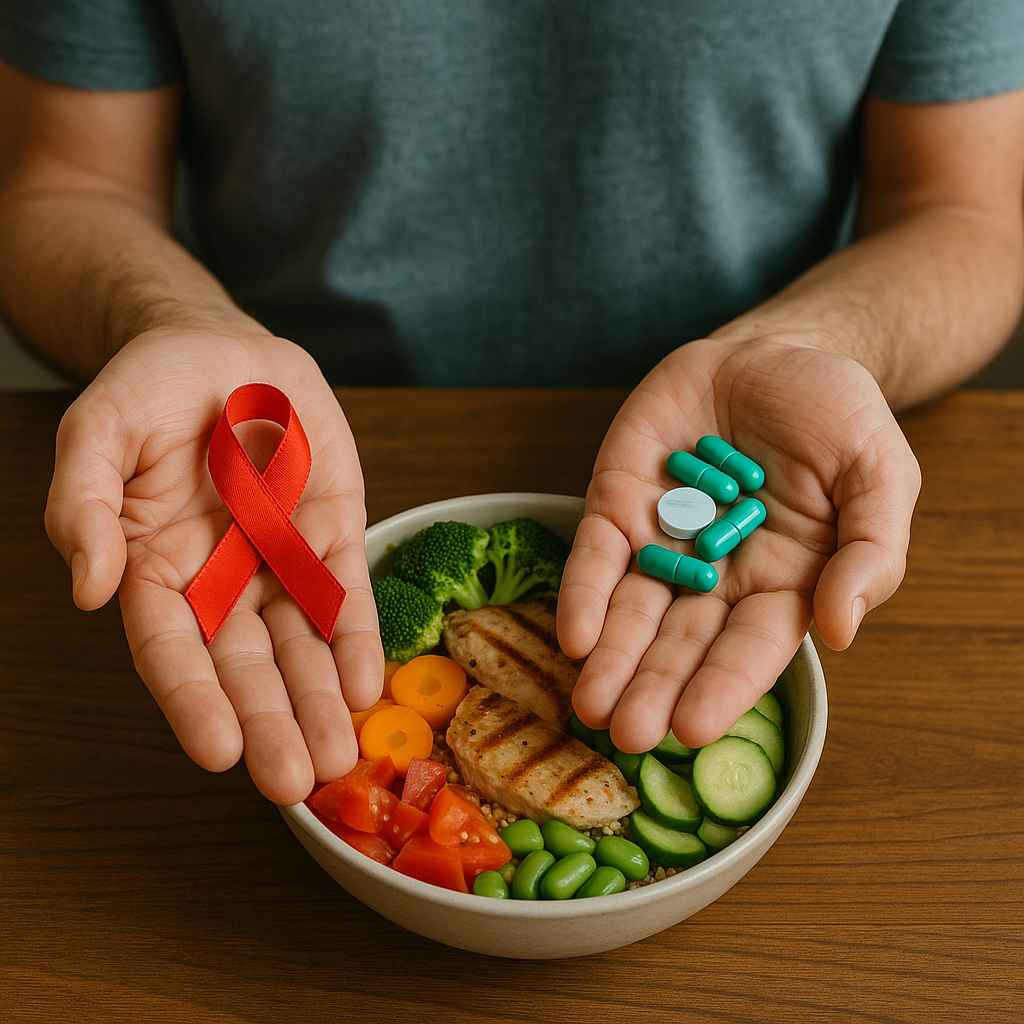Table of Contents
– Understanding the Link Between Diet and HIV
– Key Nutritional Needs for People with HIV
– Foods to Include and Avoid
– Practical Tips for Building a Healthy Diet
– Conclusion
– FAQs
Understanding the Link Between Diet and HIV
Did you know that what you eat can have a significant impact on how your body responds to HIV? Diet and HIV are deeply intertwined. A well-balanced diet plays a critical role in strengthening the immune system, reducing symptoms, and supporting the effectiveness of antiretroviral therapy (ART). People living with HIV often have higher nutritional needs, and poor diet choices can worsen the effects of the virus.
Just like a car needs the right fuel to run smoothly, your body needs proper nutrition to fight infections and manage the side effects of treatment. Ignoring nutrition can lead to weight loss, nutrient deficiencies, and a weaker immune response.
Key Nutritional Needs for People with HIV
HIV increases the body’s demand for energy, protein, and essential nutrients. The virus and its treatment can interfere with nutrient absorption, making it even more important to focus on dietary quality. Individuals with HIV should aim to consume foods rich in:
Protein
Protein helps build and repair body tissue. Include sources like lean meats, fish, beans, nuts, and tofu.
Vitamins and Minerals
Micronutrients such as vitamins A, B-complex, C, D, and minerals like zinc and selenium are vital for immune function. Fresh fruits, vegetables, dairy products, and fortified grains can help meet these needs.
Healthy Fats
Omega-3 fatty acids found in fish, flaxseed, and walnuts can help manage inflammation and promote heart health.
Fiber
Whole grains, fruits, and vegetables support digestive health and may help reduce the risk of heart disease.
It’s also essential to stay hydrated. Water aids in digestion, nutrient absorption, and detoxification.
Foods to Include and Avoid
Eating the right foods can make a significant difference in how someone living with HIV feels on a daily basis. However, it’s equally important to know which foods to avoid.
Recommended Foods
– Whole grains like oats, brown rice, and whole wheat bread
– Colorful fruits and vegetables
– Low-fat dairy or plant-based alternatives
– Lean protein such as poultry, beans, eggs, and fish
– Healthy fats including avocados, nuts, and olive oil
Foods to Limit or Avoid
– Highly processed foods with added sugars and trans fats
– Raw or undercooked meat, eggs, and seafood
– Unpasteurized dairy products
– Alcohol, which can interfere with medication and liver function
In some cases, doctors may also recommend supplements, but these should always be taken under medical supervision to avoid negative interactions with ART.
Practical Tips for Building a Healthy Diet
Transitioning to a healthier diet doesn’t have to be overwhelming. Start small and build consistent habits. Here are some actionable tips:
– Plan meals in advance to ensure a balanced intake of nutrients
– Read labels to avoid added sugars and unhealthy fats
– Cook at home more often to control ingredients and portions
– Snack smart by choosing fruits, nuts, or yogurt instead of chips or candy
– Consult a registered dietitian with experience in HIV care for personalized advice
If access to food is an issue, consider contacting a local food assistance program or a healthcare provider. For more resources, visit Healthcare.pro.
Eating well is not just about living longer—it’s about living better. A nutritious diet helps you feel stronger, supports your treatment, and improves your overall quality of life.
Conclusion
Diet and HIV are connected in more ways than most people realize. Maintaining a balanced, nutrient-rich diet can help manage symptoms, improve energy levels, and support your immune system. It’s not about strict diets or expensive supplements—it’s about making smart food choices every day. Talk with a healthcare professional or nutritionist to develop a plan that fits your needs. Remember, good nutrition is a key part of your HIV treatment journey.
FAQs
What is the best diet for someone with HIV?
A balanced diet rich in whole grains, lean proteins, fruits, vegetables, and healthy fats is ideal. Avoid processed and raw foods that can harm your immune system.
Can diet affect HIV medication effectiveness?
Yes, certain foods and supplements can interact with ART. Always consult your doctor or pharmacist before making changes to your diet or adding supplements.
Why is protein important for people with HIV?
Protein helps repair tissues, maintain muscle mass, and support immune function, all of which are critical for people with HIV.
Are there foods people with HIV should avoid?
Yes, especially raw or undercooked foods, unpasteurized products, and alcohol. These can increase the risk of infections or interfere with medications.
Is hydration important for people with HIV?
Absolutely. Staying hydrated helps with digestion, nutrient absorption, and overall health.
This content is not medical advice. For any health issues, always consult a healthcare professional. In an emergency, call 911 or your local emergency services.




